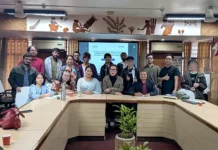[ Gunjan Sharma ]
IMPHAL, 7 Apr: Eleven months of conflict, over 50,000 displaced people and a prevailing anti-poll sentiment in a section – the election commission in violence-hit Manipur is gearing up for the challenging task of holding Lok Sabha elections in the state in less than two weeks, even as the campaign scene is muted so far.
Chief Electoral Officer Pradeep Kumar Jha said that over 24,500 displaced people have been identified as eligible to vote and special polling arrangements have been made in relief camps to enable them to exercise their franchise.
“A total of 2,955 polling stations will be set up in the state for the Lok Sabha elections, out of which around 50 percent have been identified as sensitive, vulnerable, or critical. We are also setting up 94 special polling stations to facilitate voting by internally displaced persons (IDP),” Jha told PTI.
According to the Election Commission of India (ECI) norms, a ‘vulnerability mapping’ of hamlets, villages and electoral segments that may be exposed to threat and intimidation is conducted ahead of polls.
“Steps have been taken to identify history sheeters, trouble mongers, and persons causing vulnerability and bound under the CrPC. These critical and vulnerable polling stations will be brought under webcasting and videography, along with deployment of micro observers and additional deployment of CAPF (central armed police forces),” Jha said.
Special teams have been formed to deal with voters with empathy and voter awareness activities have also started, he said.
“The activities are being designed keeping in mind the sentiments of the displaced people who have lost the comfort of being in their home and there is some level of frustration and negativity,” he added.
A majority of over 50,000 internally displaced people are currently staying at relief centres across five valley districts and three hill districts.
Scheduled in two phases on 19 and 26 April, the elections in two Manipur Lok Sabha seats have garnered attention, especially in the issue of voting arrangements for the displaced population.
Several civil society groups and the affected people have been questioning the relevance of elections in the strife-torn state. There have also been calls from several quarters about boycotting the polls.
Noting that there are over 20 lakh voters in Manipur and women voters outnumber the men voters, Jha said, “The state has traditionally been seeing a very high voting percentage in the previous elections, which is reflective of the people’s faith in the electoral process.”
“Even if some people are feeling negative about it, we are trying to create awareness about making each vote count and taking some confidence-building measures,” he said.
Asked about the security arrangements for the polls, Jha said that over 200 companies (around 100 personnel each) of paramilitary forces have been allocated to the state.
“The idea is not only to ensure that the displaced voters do not miss out on the chance but also that they feel safe. Adequate security arrangements are being made across the state.
“Video surveillance has already begun and the entry and exit points are being monitored. It is obvious to have concerns about security considering the conflict in the state. However, these concerns are being addressed,” he said.
To check election expenditure, 197 flying squads, 194 static surveillance teams, 92 video surveillance teams, 60 video viewing teams and 60 accounting teams have been constituted and trained, Jha added.
Posters of political parties, mega rallies and visible movement of leaders – the traditional elements of campaigning – are conspicuously missing in violence-hit Manipur.
The only visible hint of the impending election is the hoardings put up by local election authorities, urging citizens to exercise their franchise.
Major party figures have refrained from visiting the conflict-ridden state to canvass for votes or make electoral pledges.
Jha admitted that the campaign is low-key in the state but maintained that there are no restrictions from the EC.
“There are no restrictions from the Election Commission’s side on campaigning. Anything which is within the boundaries of the model code of conduct is allowed,” he said. (PTI)

